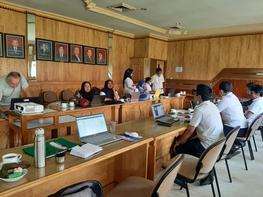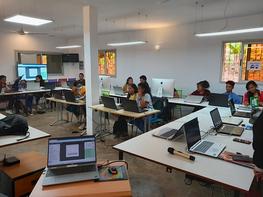NIRS training (Near infrared spectroscopy) in 2022
Gilles Chaix, CIRAD researcher from the UMR Agap Institute assigned to the Plant Histocytology and Cell Imaging Platform (PHIV) and president of the HelioSPIR association, has carried out several training sessions in the framework of scientific projects.
se various training courses were carried out at the UMR Écologie des Forêts de Guyane (EcoFoG) as part of the Aquil@ria project (Feder) led by A. Zaremski (Cirad, UMR Agap Institute, Genome and selection of perennials team (GSP), in Indonesia at Indonesia Rubber Research Institute as part of RUBIS project (Agropolis) by P. Montoro (CIRAD, UMR Agap Institute, Integrative Biology of Abiotic Stress in Perennial Plants team (BISSAPP), in Costa Rica at INTA and the University of Costa Rica within the framework of the PRPP project (AFD) in collaboration with Julien Demenois (Agroecology and Sustainable Intensification of Annual Crops Aïda), in Brazil at the Federal University of Lavras (UFLA) in the framework of projects CAPES and CNPQ funding led by Professor Paulo Hein, in Madagascar at the University of Antananarivo in the framework of the Forests and Biodiversity PD and the G3D project (EU) with the team of ESSA-FORETS wood science unit led by Professor Tahiana Ramananatoandro, head of the ESSA-FORETS department.
During these courses, more than 60 people were trained on the principles of near infrared spectroscopy for phenotyping, the use of ChemFlow data analysis software and on applications related to local needs.medium
In addition to the students whose training was part of an ESSA-FORETS M1 course, the trainees were able to develop NIRS phenotyping approaches on different matrices and products, such as:
- In Costa Rica: organic matter and carbon in soils for the assessment of activity and the carbon balance of soils, physiological status of plants in the context of studies on water stress,
- In Indonesia: certain properties of rubber latex in connection with latex diagnosis and clone discrimination,
- In Brazil and Madagascar: wood properties (lignin, cellulose, etc.) and discrimination of forest species by NIRS spectroscopy,
- In French Guiana: the presence of Aquilaria blackwood on cores and wood slices taken from previously inoculated trees.
These training sessions have made it possible to create, maintain and reactivate partnerships. Collaborations are being created with partners in Costa Rica. The partnership with UFLA in Brazil has been re-launched through the co-supervision of thesis and Master's students. Malagasy students were assessed and some selected for an M1 internship in Madagascar.
Published: 27/02/2023


